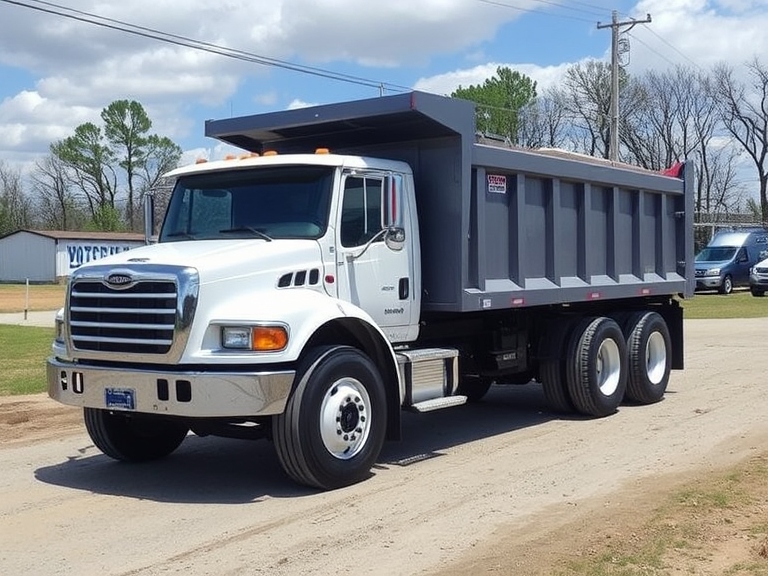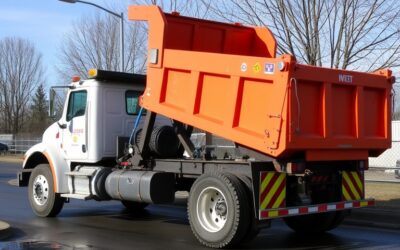Dump trucks are essential for moving heavy loads on construction and mining sites, but their size and weight make them prone to accidents. Preventing these incidents is crucial for a safer job site. However, due to their size and the heavy materials they carry, they are also at high risk for accidents. Dump truck accidents can cause serious injuries, damage equipment, and result in major delays on work sites.
Preventing these accidents is crucial for ensuring the safety of drivers and other workers involved. Simple practices and technologies can make a big difference in keeping dump trucks stable and secure. Regular maintenance and careful driving are key components in reducing the risk of accidents.
Understanding Common Causes of Dump Truck Accidents
To prevent dump truck accidents, you first need to understand the most common causes: One major cause is improper load distribution. When the material in the dump bed is not evenly spread, it creates an imbalance. This imbalance makes the truck more likely to tip over, especially during unloading when the bed is elevated.
Another primary cause of accidents is driving on unstable or uneven terrain. Dump trucks often work on construction sites with soft soil, steep slopes, and rough ground. Navigating these conditions can be tricky, and the truck might become unstable, leading to a potential tip-over.
Operator error also contributes significantly to accidents. Inexperienced or careless driving includes making sharp turns, sudden stops, or driving too fast. These actions can cause the load to shift abruptly, upsetting the truck’s balance. It’s essential for operators to have proper training and to drive carefully to avoid these risks.
Essential Safety Practices for Dump Truck Operators
Operators can significantly reduce accident risks by following these essential safety tips:
1. Proper Load Distribution: Always ensure the load is evenly spread in the dump bed. An uneven load can make the truck unbalanced and prone to tipping.
2. Safe Driving: Operators should drive slowly and carefully, especially on uneven or soft terrain. Avoid making sharp turns or sudden stops that can cause the load to shift.
3. Secure Loads: Always secure the load properly before transport. Use tarps or nets to keep materials from falling out and causing accidents.
4. Pre-Trip Inspections: Perform a thorough inspection of the truck before starting the trip. Check the tires, brakes, and hydraulic systems to ensure everything is in good working order.
5. Stay Alert: Operators should stay aware of their surroundings. Watch for obstacles, pedestrians, and other vehicles. Staying alert helps in making quick decisions to avoid accidents.
By following these safety practices, dump truck operators can significantly reduce the risk of accidents. These steps ensure a safer environment for everyone on the job site.
Implementing Technology to Enhance Dump Truck Safety
Smart technology can make dump trucks safer and more efficient. Here’s how: One key technology is the anti-tip kit. These kits monitor the truck’s balance in real-time and make adjustments to prevent tip-overs. They alert drivers when the truck is at risk of tipping, allowing them to take corrective action immediately.
GPS systems are another useful technology. They help operators navigate difficult terrains by providing real-time location data. GPS can also track the truck’s speed and routes, ensuring operators follow safe practices. This reduces the risk of accidents caused by poor navigation or speeding.
Cameras and sensors add an additional layer of safety. Rearview cameras help drivers see behind the truck during reversing, avoiding obstacles and preventing collisions. Proximity sensors can detect objects around the truck and alert the driver, reducing the likelihood of accidents on busy job sites.
Regular Maintenance and Inspections for Accident Prevention
Routine maintenance is a must to prevent accidents and keep your dump trucks in top shape: A well-maintained truck is less likely to experience mechanical failures that could lead to accidents. Here are essential maintenance practices:
1. Routine Checks: Conduct daily checks of key components like tires, brakes, and hydraulic systems. Address any issues immediately to ensure the truck operates safely.
2. Scheduled Maintenance: Follow the manufacturer’s recommendations for scheduled maintenance. This includes oil changes, brake inspections, and hydraulic system checks.
3. Detailed Inspections: Perform thorough inspections at regular intervals. Look for signs of wear and tear, such as cracked hoses, worn-out tires, and loose bolts.
4. Documentation: Keep detailed records of all maintenance and inspections. This helps track the truck’s condition and ensures that all necessary work is done on time.
By implementing these maintenance practices, you can keep dump trucks in top condition and significantly reduce the risk of accidents. Well-maintained trucks are safer and more reliable, contributing to a safer work environment.
Conclusion
Preventing dump truck accidents is essential for safety and smooth operations. By following key safety practices, using smart technology, and maintaining your trucks regularly, you can create a safer worksite and keep projects on track. Understanding the common causes of accidents, following essential safety practices, and implementing advanced technology can greatly reduce the risks. Regular maintenance and thorough inspections ensure that dump trucks are always in good working condition, minimizing the chances of mechanical failures.
Creating a safe work environment requires a combination of proper training, smart technology, and diligence in maintenance. By taking these steps, we can protect our workers, reduce costs, and ensure that projects run smoothly and without delays.
For the ultimate in dump truck safety, consider using Wink Anti-Tip’s anti-tip over device. Our advanced system helps prevent tip-overs, ensuring your operations run safely and efficiently. Explore Wink Anti-Tip for more details and take the next step in enhancing your dump truck safety today!





